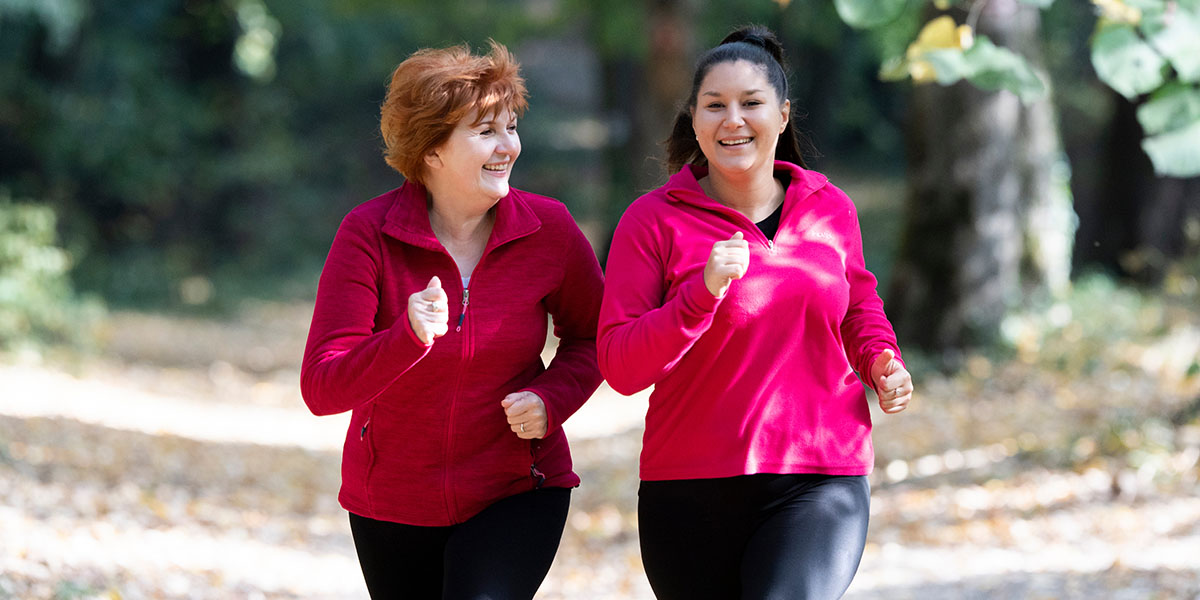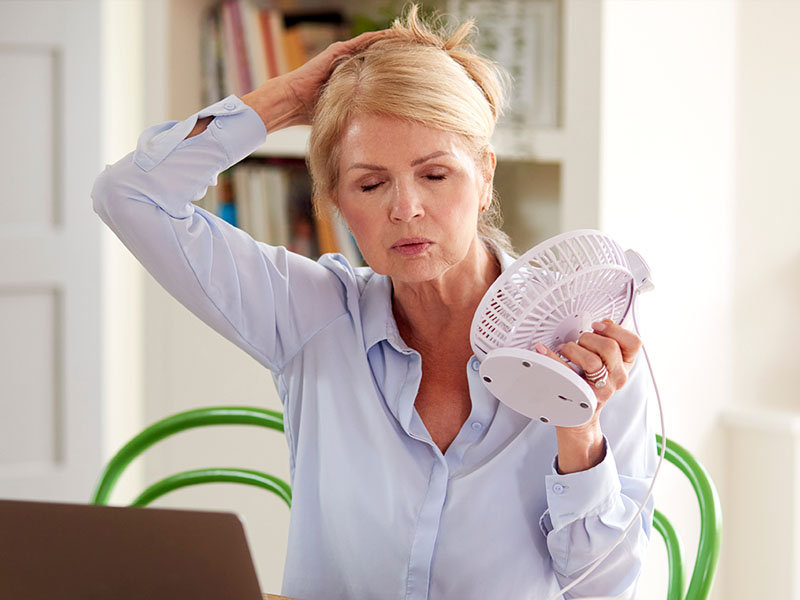
During the transition to menopause, called perimenopause, changing hormone levels can affect your menstrual cycle and cause symptoms like hot flashes and problems sleeping. As you get closer to menopause, you may notice other symptoms, such as pain during sex, urinary problems, and irregular periods. Talk to your health care provider about your symptoms. Medicines and other treatments can help relieve your symptoms.
Perimenopause and menopause can encompass many symptoms, including not feeling like your usual self. To learn about perimenopausal and menopausal symptoms and treatments and how to develop personalized plans, see MyMenoplan.org, supported with funding from The National Institute on Aging (NIA).
Menopause symptom: Hot flashes
Hot flashes, also called hot flushes, are the most common menopause symptom. As many as three out of four women experience hot flashes. Some women begin having hot flashes before menopause, when they are still getting a period.
Hot flashes are a sudden feeling of heat in the upper part of your body. Your face and neck may become red. Red blotches may appear on your chest, back, and arms. You may also get heavy sweating during hot flashes or cold chills after the hot flashes. Some women get more cold chills (also called cold flashes) than hot flashes.
Hot flashes are most common in women in the year before their period stops and in the year after their period stops. However, recent studies show that hot flashes can continue for up to 14 years after menopause. Health care providers and researchers do not know why hot flashes are so common during menopause. There are medicines that can prevent some hot flashes, and there are ways you can try to manage hot flashes when they do happen.
What you can do

- Consider using hormone therapy. If you still have menstrual periods, ask your health care provider about low-dose hormonal birth control. This may help your symptoms. For women who have gone through menopause, menopausal hormone therapy helps relieve hot flashes and night sweats. There are risks to menopausal hormone therapy. Ask your doctor whether it may help you. If you decide to use menopausal hormone therapy, take it for the shortest amount of time possible in the lowest dose that helps your symptoms.
- Consider other medicines. If hormone treatments are not an option for you, ask your health care provider about prescription medicines used for other health problems. Certain antidepressants, epilepsy medicine, and blood pressure medicines may help with hot flashes, even if you don’t have these specific health problems.
- Track your hot flashes. Write down what triggers your hot flashes and try to avoid those things. Possible triggers might include spicy foods, alcohol, caffeine, stress, or being in a hot place.
- Drink cold water. Keep ice water close by to drink when you feel a hot flash coming on.
- Take off a layer of clothing. Dress in layers as much as possible.
- Use a fan. Turn on a fan at night by your bed and keep one at work if possible.
- Take deep breaths. Try taking slow, deep breaths when a hot flash starts. Slow, deep breaths tell your body that it is time to relax and be calm. This might make hot flashes shorter.
- Consider losing weight. Hot flashes may be worse in women who have overweight or obesity.
Menopause symptom: Vaginal problems and infections
Vaginal problems, such as vaginal dryness, may start or get worse in the time around menopause. Low levels of the hormone estrogen may cause your vaginal tissue to get drier and thinner. This can cause itching, burning, and pain or discomfort. It also can have sex painful and cause small cuts and tears in your vagina during sex. Vaginal cuts or tears put you at higher risk for sexually transmitted infections (STIs).
What you can do
- Vaginal moisturizer. An over-the-counter vaginal moisturizer can help keep your vagina lubricated and can make sex more comfortable. You use this every few days.
- Vaginal lubricant. A water-based, over-the-counter vaginal lubricant can help make sex more comfortable. You use this before or during sex.
- Prescription medicine. You can also talk to your health care provider about other ways to treat your vaginal dryness, including hormonal birth control, menopausal hormone therapy, or a prescription estrogen cream, gel, or ring that is inserted into your vagina. Learn more about menopause treatments. All medicines have risks, so talk to your health care provider first.
Menopause symptom: Irregular periods or bleeding
Your periods may come more often or less. They may last more days or fewer and be lighter or heavier. Missing a few periods does not always mean you are in perimenopause or the transition to menopause.
What you can do
- See your health care provider to make sure there are no other reasons for your missed periods, like pregnancy or a health problem.
- See your health care provider also if you have not had a period for a year and start bleeding or spotting. In women who have gone through menopause, spotting or light bleeding could be caused by cancer or another serious health problem.
Menopause symptom: Problems sleeping
Many women in perimenopause and menopause find it hard to sleep through the night. Low levels of progesterone can make it hard to fall and stay asleep. Low estrogen levels can also cause hot flashes that make you sweat while you sleep. This is sometimes called night sweats. Many menopausal women get urinary symptoms that make them get up several times during sleep to urinate. You may also feel more tired than usual during the day.
What you can do
- Exercise. One of the best ways to get a good night’s sleep is to get regular physical activity. But you may need to work out earlier in the day. Too much activity close to bedtime can make you more awake. Even if you have not exercised regularly in the past, starting to exercise during menopause may help you feel better. Studies show that certain exercises, such as yoga and stretching, may help improve hot flashes.
- Do not eat, drink alcohol, or smoke before bed. Avoid large meals, smoking, and drinking alcohol right before bedtime. Avoid caffeine after noon.
- Drink warm drinks. Try drinking something warm before bedtime, such as caffeine-free tea or warm milk.
- Limit screentime near bedtime. Limit TV, phone, or computer use near bedtime, especially in your bedroom. The bright light of the screens tell your brain to wake up instead of sleep.
- Practice good sleep habits. Keep your bedroom dark, quiet, and cool. Use your bedroom only for sleep and sex, if you can.
- Don’t nap during the day. Try to go to bed and get up at the same time every day.
- Train your brain. If you wake during the night and can’t get back to sleep, get up and do something relaxing until you’re sleepy again.
- Talk to your health care provider. Talk to your health care provider about your sleep problems, as it could be something serious. Many women develop sleep apnea or insomnia. Treating sleep problems can also help improve chronic pain.
- Consider treatment for hot flashes. Talk to your health care provider about treatment for your hot flashes if they are causing your sleep problems. This will usually improve your sleep.
- Treat bladder problems. Talk to your health care provider about treatment for urinary problems. Urinary or bladder incontinence is not a normal part of the aging process. There are treatments that work.
Menopause symptom: Memory problems
You might become forgetful or have trouble focusing. As many as two-thirds of women going through perimenopause say they have problems with memory or trouble focusing. Menopausal hormone therapy does not treat or prevent memory loss or brain diseases, including dementia and Alzheimer’s disease.
What you can do
- Get enough sleep and physical activity, eat healthy and don’t smoke. This may improve memory.
- Stay socially active. Join a group or club that focuses on activities you enjoy, such as a hiking or book club. Social interaction may help delay memory loss and prevent diseases such as dementia and Alzheimer’s disease.
- Stay mentally active. You may be able to boost your memory and focus by doing mental activities like crossword puzzles, taking a class, or learning a new skill like a foreign language.
- Talk to your health care provider if forgetfulness or other mental problems affect your daily life.
Menopause symptom: Urinary problems
Many women develop bladder or urinary problems during perimenopause and menopause. Some women find it hard to hold their urine long enough to get to the bathroom. This is called urinary incontinence. Urine might also leak out when you sneeze, cough, or laugh. This is called urinary stress incontinence. Some women have disrupted sleep during menopause because of the need to urinate during sleep. Urinary problems after menopause are not a normal part of aging and can be treated.
What you can do
- Treatment for urinary incontinence can include limiting or avoiding caffeine, taking medicine, using special medical devices, physical therapy, or having surgery, depending on the cause of the condition.
- If you have urine leakage, you can try urinary incontinence products such as pads, a urethra cap, or a pessary. A urethra cap fits over your urinary opening. It is reusable. A pessary is a round disc that is inserted into your vagina to support your bladder. Your health care provider will fit you for your pessary, but you can remove, wash, and reinsert it yourself.
- Talk to your health care provider about things you can do at home to help treat urinary incontinence. These may include a special kind of exercise for your pelvic floor muscles called Kegel exercises. Your health care provider may also suggest losing weight because extra weight puts more pressure on your bladder and nearby muscles.
 Menopause symptom: Mood changes
Menopause symptom: Mood changes
You might feel irritable or have crying spells. If you had mood changes with your monthly periods or depression after giving birth, you may be more likely to have mood changes with perimenopause or menopause, too. Even if you never experienced mood changes during your monthly periods or after giving birth, you may still get mood changes during the transition to menopause. Mood changes at this time also could be from stress, family changes, or feeling tired. Mood changes are not the same as depression.
What you can do
- Try to get seven to nine hours of sleep.
- Get active to help you feel your best. Find ways to get active.
- Avoid taking on too many duties as much as possible. Look for positive ways to ease your stress.
- Join a support group online or in your community with women who are also going through menopause.
- Talk to your health care provider about menopausal hormone therapy, which can help with mild mood changes. All medicines have risks, including menopausal hormone therapy. Mood changes that happen during menopause are usually not the same as depression, which is a different, serious illness that also needs treatment.
Menopause symptom: Depression and anxiety
Your risk for depression and anxiety is higher during the time around menopause. This may be caused by changing hormones, menopausal symptoms, or both. You may experience sadness or depression over the loss of fertility or the changes in your body. If you have symptoms of depression or anxiety, see your health care provider. They may recommend therapy or medicine or both to treat depression or anxiety.
What you can do
- Sleep. Try to get enough sleep. Most adults need between seven and nine hours of sleep each night. Lack of sleep is linked to depression.
- Exercise. Get at least 30 minutes of physical activity on most days of the week. Exercise is proven to help with depression. See our Fitness and Nutrition section for tips on how to get active.
- Limit alcohol. Limit how much alcohol you drink, if any. A moderate amount of alcohol for women is one drink a day, and no more than seven drinks in a week. Four or more drinks at a time is considered binge drinking.
- Lower stress. Set limits for how much you take on. Look for positive ways to unwind and ease daily stress. Try relaxation techniques, reading a book, spending some quiet time outdoors, or other healthy ways to unwind.
Menopause symptom: Changing feelings about sex
Some women feel more comfortable with their sexuality around menopause. Others may feel less aroused. You may feel less interested in sex if it is uncomfortable or painful. This can happen because of drier or thinner vaginal tissue.
What you can do
- If you are bothered by vaginal dryness, there are safe over-the-counter and prescription treatments to improve vaginal lubrication. Learn more about menopause and your sexuality.
- Some women are less interested in sex during menopause because of other menopause symptoms such as depression, anxiety, or lack of sleep. Talk with your health care provider about possible treatments if your menopause symptoms bother you.
How can I talk to my family and friends about my symptoms?
Many women find it helpful to reach out to supportive family or friends during perimenopause and menopause.
If you are having trouble talking about this new stage of life:
- Remember that you are not alone. All women go through menopause after a certain age.
- Mention that you are dealing with menopause symptoms and would like to talk about it.
- Ask questions and talk about your experiences.
Talking with your friends and family can help them understand how perimenopause or menopause affects you. They may have tips for you or ideas on how they can help.
When should I see my doctor about my menopause symptoms?
If any of your menopause symptoms bother you, talk with your health care provider. When you talk about treatments, you might discuss:
- Your symptoms and how much they bother you
- Your health risks based on your age and your health
- Whether you have used a treatment like menopausal hormone therapy before
- Whether menopausal hormone therapy is an option for you, based on your past health and family history
- Whether you have already reached post-menopause and, if so, how long ago
Are there health care providers who specialize in the treatment of the symptoms of menopause?
The North American Menopause Society offers a directory of professionals who provide health care for women through perimenopause and beyond.

